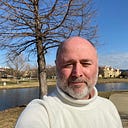I like the questions you ask in this. I love science. I am also interested in a philosophy of metaphysics.
It interests me that every era of human, every independent culture, we all have had people who have reported inexplicable experiences, sufficient to warrant further openness in allowing for it, if not studying it.
And, we can rule out mental health- all cultures have people who have suffered, and even though we as a society today have better ways of diagnosis and understanding, there is distinct difference between suffering mental illness and having inexplicable experiences. Functionality is a reasonable measure- and still, people who are evidently not fitting criteria for mental health, are functioning in families and work- we hear their stories and too many of us assume- crazy? Why does that seem to be our default position for anything out of our normal range of perception?
How many of the esteemed philosophers of Western philosophy have had experiences? Aristotle? Plato? One had a Daemon, one had memories of past lives? You mentioned Carl Jung- he hallucinated 'Philemon.' A 'spirit guide' that he conjured practicing active imagination? Jung's collective unconscious is as 'mother sea?'
I am also interested in hypnosis. It seem to be a tool we have for exploring consciousness, hypnosis, so why is it not generally more employed. Anyone can set up a lab, screen for candidates and control groups, rigorously modify language sets to avoid leading, and duplicate or 'null out' claims by other hypnotists exploring information from subjects given in ultra deep trance states. Doctor Michael Newton's book, Journey of Souls, per Newton, was based on interviewing 7,000 subjects under hypnosis. He may have actually done that, but there is no control? Did all 7000 report 'afterlife' experiences, or a fraction? Even if it were only a fraction of clients, or if he only had clients with predispositions for this unconscious pattern, which is possible given his clients came to him and he had some sort of selection process, isn't it in the realm of science to try and duplicate and measure independently? Because, as your essay suggests, it's not just Newton making these claims... Richard Martini, 'hacking the after life' author, claims you don't even have to hypnotize subjects- you just interview people in a particular way, call it 'a game,' to bypass our normative filters, and you get consistent answers across a continuum of diverse people and beliefs- that, too is science, but the validity would go up if other people tried to duplicate it in a more precise, rigorous manner.
I accept my interests are likely influenced by the fact I am going to die. No way around that. But aren't we all going to die? Shouldn't we all be more curious about the process? It is a process. Unlike the joke by Sam Kinison, you're alive, you're alive, you're dead... there appears to be a lingering- the brain could take hours to die- per fMRI studies? If that's true, even outside of a philosophy of metaphysics, that's kind of scary- locked in a body degrading, and aware? Doesn't knowing that inform how we might seek to comfort those who are dying? Again, we're all going here.
